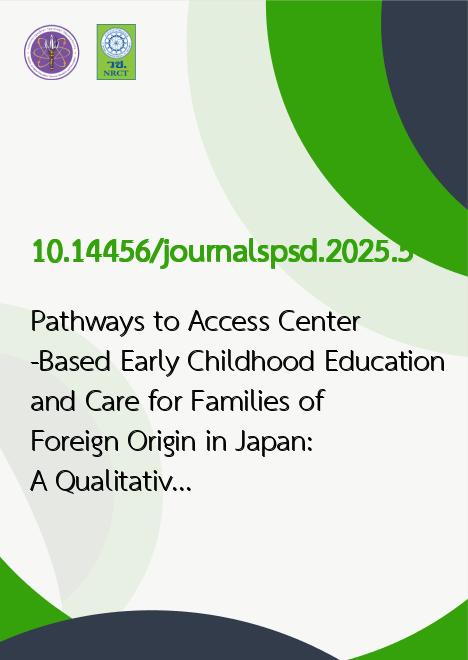
|
Pathways to Access Center-Based Early Childhood Education and Care for Families of Foreign Origin in Japan: A Qualitative Analysis Using Levesque’s Framework of Access |
|---|---|
| รหัสดีโอไอ | |
| Creator | Yuki Ohsaka |
| Title | Pathways to Access Center-Based Early Childhood Education and Care for Families of Foreign Origin in Japan: A Qualitative Analysis Using Levesque’s Framework of Access |
| Publisher | Faculty of Social Administration, Thammasat University |
| Publication Year | 2568 |
| Journal Title | Journal of Social Policy, Social Change and Development |
| Journal Vol. | 3 |
| Journal No. | 1 |
| Page no. | 69-89 |
| Keyword | Early childhood education and care, Access to services, Accessibility, Qualitative study |
| URL Website | https://so10.tci-thaijo.org/index.php/journalspsd/issue/view/224 |
| Website title | Journal of Social Policy, Social Change and Development |
| ISSN | 2985-0800 |
| Abstract | The number of foreign residents in Japan is increasing, and correspondingly so is the number of preschool-age children of foreign origin living in Japan on a mid- to long-term basis. Thus, it is increasingly important to ensure opportunities for early childhood education and care (ECEC) for these children with diverse origins. Although previous studies have shown a higher rate of non-enrollment in center-based ECEC in children of foreign-national parents compared with children of parents of Japanese nationality, only a limited body of research has comprehensively examined the details of the process through which children of foreign origin gain access to ECEC opportunities. In this study, semi-structured interviews were conducted with parents from 23 families to identify facilitating and inhibiting factors faced by families of foreign origin who wish to enroll their children in center-based ECEC in Japan. These interviews were analyzed with the aid of the theoretical framework by Levesque et al. As a result, facilitating and inhibiting factors for both service users (parents) and service providers (ECEC facilities and municipalities) were identified. The author found that access to ECEC for families of foreign origin is often a reversible process, with families potentially returning to earlier stages of the process—even after reaching the final stage. It was also confirmed that ECEC access for families of foreign origin is constrained by language and institutional barriers and is promoted by social support from diverse communities. These findings suggest that improved access to ECEC for children of foreign origin requires provision of appropriate enrollment information to the diverse communities that these families engage with, including communities of ethnic minorities, workplaces, and universities. |